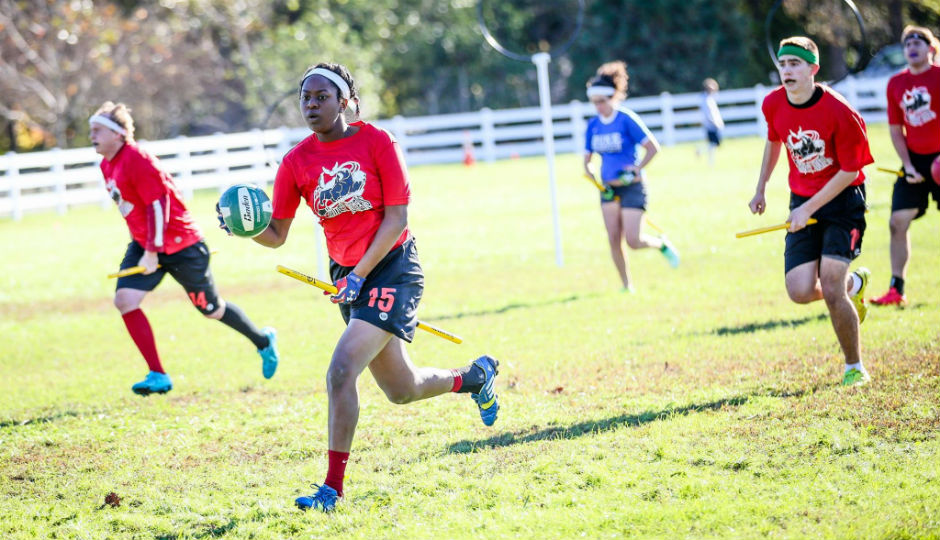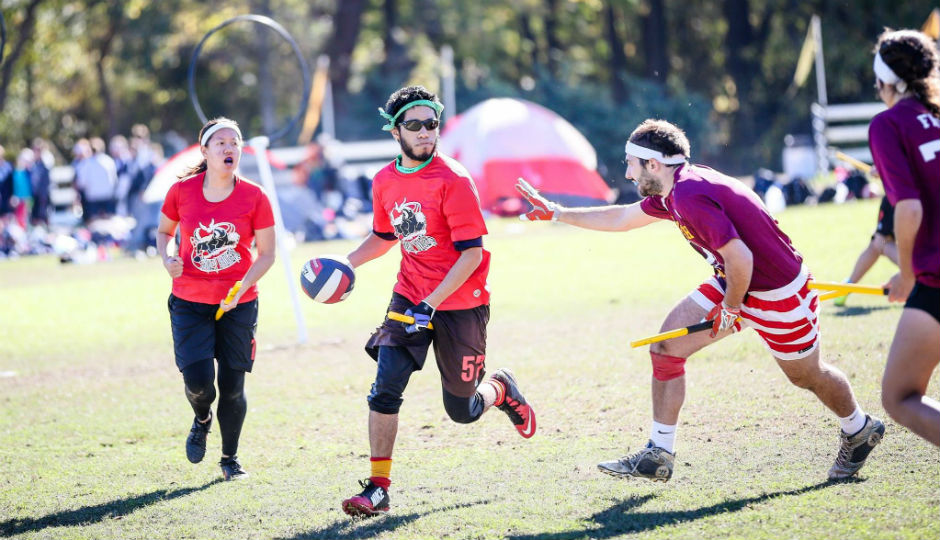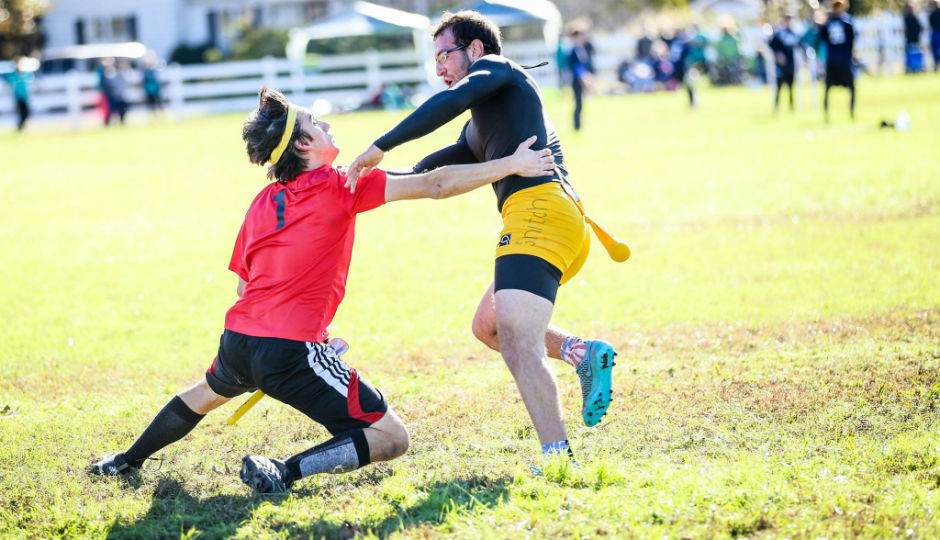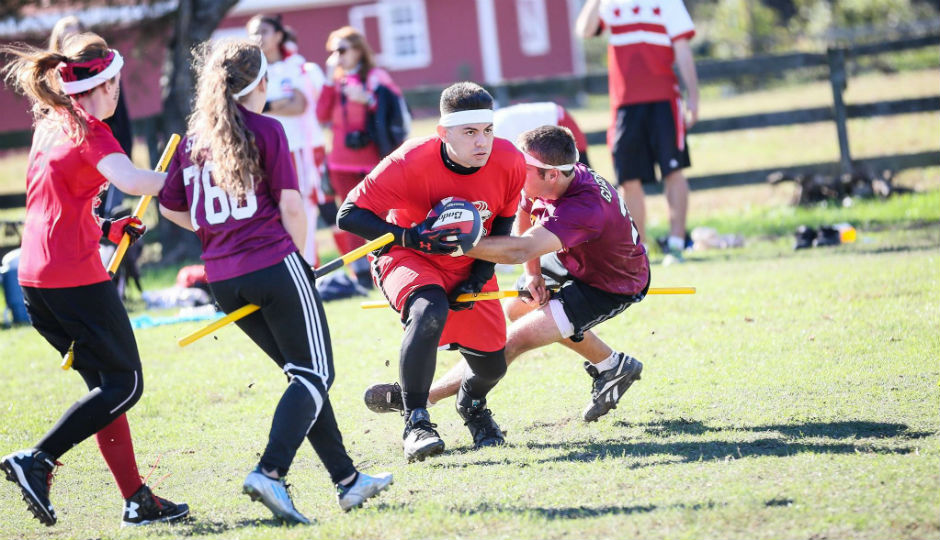Inside the Increasingly Rough-and-Tumble Philadelphia Quidditch Scene

Photo | Isabella Gong Photography
They hurtle toward each other, six per team, cleats sloshing with mean vigor on the ground still wet from the morning sprinklers. The quickest, most audacious head toward midfield where an under-inflated volleyball and three dodgeballs await. They jostle violently for the balls but only with one hand. The other must always – always – hold on to the broom.
Unfortunately, magic broomsticks do not exist on earth. So they carry three-foot-long PVC pipes between their legs instead, one hand latched with the desperate clasp of a bull rider.
A few minutes before the match began, a small swarm of dragonflies circled this field on 31st and Chestnut next to the train tracks. But in the minds of the athletes playing competitive Quidditch on this warm afternoon in July, they may as well be flying too. Dodgeballs are now caroming off people so hard that spectators wince from the sidelines. Hit in the face? No matter. Get off your broom and touch your goalposts. Play on. If you have the volleyball, you sprint toward your opponent’s three plastic hula hoops, spinning, juking, jumping, passing. Avoiding tackles and dodgeballs, all with one simple goal: shoot that volleyball through the hoop. A few minutes in, the red team scores. Seconds later, an agile speedster wearing a baby blue North Carolina jersey and a white headband takes the volleyball and runs the length of the field. He weaves through a sea of red, a cheetah with tunnel vision, now only 20 feet away from goal. He’s unstoppable. Until he crashes into the meaty outstretched arm of a red player and crumples to the ground.
“Brooms down!” The whistle of the referee fills the summer air. PVC pipes drop.
Normal humans were never supposed to play Quidditch, the high-octane fantasy sport conjured by J.K. Rowling for wizards and witches in her series of Harry Potter novels. But in 2005, a group of Potter fans at Middlebury College decided to adapt the game for real-world play. Since then, the sport has flown across campuses, countries, even continents — in July, the Quidditch World Cup, held over two days in Frankfurt, Germany, drew 21 teams from five continents (the United States lost to Australia in what amounted to an earth-shattering upset in the Quidditch world, if you were wondering).

Photo | Isabella Gong Photography
Here’s how the game, adapted for muggle play, works: A player must carry his or her — the sport is co-ed — broomstick at all times. If you get hit by a bludger (one of the dodgeballs), you dismount your broom and run back to touch your goalposts. If you score the quaffle (that’s the deflated volleyball), your team gets 10 points. The game ends when one of the seekers catches the snitch, which we’ve not covered yet: It’s released onto the field after 18 minutes. In Harry Potter, the snitch is a tiny, sentient golden ball with wings. In real life, the snitch is usually a man, often a large one, dressed in all-yellow — and with a tennis ball in a yellow sock dangling from the back of his shorts. The snitch is worth 30 points. Catch the snitch, end the game. Whoever has the most points wins.
Philadelphia’s is still an up-and-coming Quidditch scene. Penn, Villanova, and Drexel all have collegiate teams, but there is only one community squad, the Honey Badgers. The group, made up of mostly just-out-of-college twenty-somethings, has traveled as far as Austin, Texas, for tournaments. Travel is to be expected, if you’re dedicated to Quidditch. This weekend, in tandem with the Chestnut Hill Harry Potter Festival, the Honey Badgers will compete against teams from across the East Coast in the seventh annual Brotherly Love Cup.
•

Photo | Isabella Gong Photography
MARGE JACOBS drove five hours from Rochester, New York, to watch her son, Brendan, play in the Honey Badgers’ annual summer fantasy tournament in Philadelphia. The Jacobs are a football family — Brendan, a broad-shouldered hulk with a freckled baby face, played in high school. His brother played in college. But Brendan’s foray into Quidditch has turned the Jacobs clan into a two-sport family.
“It’s a friendly, competitive sport, not horribly aggressive,” Marge says. “I wish they had it when I was younger.” Though the sport was founded by college students, some of the high schools around Rochester have already established teams, further evidence of the mainstreaming of an activity that Marge says “started out as a geek sport.”
Marge isn’t wrong — back in the early days at Middlebury, the pioneers of Quidditch honored the sport’s fantasy roots religiously. They wore capes and ran around on actual broomsticks. Sure, it was nerdy, but that was the point. The game’s creators were rabid Harry Potter fans, after all. But as Quidditch has grown, it has slowly begun to distance itself from the game’s roots. Nobody wears capes anymore, and players ride on those safer PVC pipes, which you can purchase from your local hardware store.
William Messner, a five-year Quidditch veteran, has witnessed the shift firsthand. When he first joined the Honey Badgers, you could still use broomsticks. People took the game less seriously, too. He’d spend his time between matches drinking at the nearest bar.
“We were a bunch of drunks and strippers,” he says proudly.
•

Photo | Isabella Gong Photography
ON THIS Sunday in July at the Honey Badgers’ tournament, nobody looks to be fooling around. One of the coaches, who sports a semi-intimidating handlebar mustache, has even orchestrated the Quidditch equivalent of a layup line as a warmup. Players rifle the quaffle to each other and slam it through one of the three hula-hoops in a well-rehearsed dance. Meanwhile, a middle-aged man watches curiously from afar, leaning anonymously against a concrete wall. “What are they riding around on? Horses?” he asks, chuckling.
Strictly speaking, this tournament isn’t even official. The are no pre-formed teams — players were selected by four general managers, like in fantasy football. So Alvin Arnold, the tournament director and a former member of the Honey Badgers, gathers all of the players before the day’s matches to remind them of the number one rule of Quidditch: “Don’t be a dick.” In other words, “please don’t needlessly injure someone.”
Unfortunately, that is a big ask in a contact sport where full-speed collisions are commonplace. Over the course of the day’s games, one guy sprains his ankle so badly he has to be helped off the field, pogo-sticking on his good leg as he splays his arms over the shoulders of two teammates. Another girl hyperextends her elbow after a vicious tackle, walking off the field with tears in her eyes and one arm gingerly holding the other in a makeshift sling. So yes, it was a pretty good day for injuries, all things considered. At least no one had to be taken off in an ambulance like three years ago.
Ask a Quidditch player about the injuries he’s seen, and what you’ll get is something resembling a bone-by-bone breakdown of the entire human body. Collarbones and noses. Concussions. One spectator, Tom Powers, watches the day’s action from a lawn chair, his crutches never too far out of reach. He recently got tackled around the neck during a game. The result: dislocated knee, torn ligament, fractured kneecap and cartilage damage. It’s hard to imagine a stereotypical Harry Potter bookworm surviving even one of today’s matches.
The geek-athlete divide is perhaps the most serious issue facing Quidditch today. As more and more athletes have become drawn to the sport, it has grown more physical. More of a sport, less of a game. But Quidditch also prides itself on its inclusiveness, and to alienate the very group of people that started the game smacks of sacrilege.
To become too serious, too competitive, would be to lose players like Jared Rohrer, a 40-year-old who formed his first Quidditch team with friends from a Harry Potter fan club. A large-bellied man, Jared looks woefully out of place on the field — he wears chemistry teacher protective goggles, a mouthguard so large it seems to stretch his entire jaw, and a blue bandana tied around his head to match his baby blue shirt. And yet there he is, throwing dodgeballs at kids 15 years his junior, even getting in a few tackles along the way. Quidditch has helped him lose 30 pounds; now, he’s a personal trainer. Part of Quidditch’s appeal is this egalitarian spirit.
But more athletically inclined players, like Honey Badgers head coach John Bridstrup, can’t help but speculate how the sport might improve were the Harry Potter influence to disappear entirely. He’s a hockey player by training and was drawn to the contact element of Quidditch. He never read the books. “Harry Potter has a negative effect on attracting athletes,” he says. This is a problem for a coach whose goal is to qualify for the U.S. Nationals for the first time next year. This weekend’s Brotherly Love Cup represents an important chance to build team chemistry before national qualifiers in November.
Rohrer, meanwhile, doesn’t believe that Quidditch is being held back in any way by Harry Potter. “The sport doesn’t need to divorce Harry Potter to grow,” he says. “It needs to work on explaining the rules, getting fans, getting kids to play.”
He rejects the notion that Quidditch is an inherently odd sport. All sports were bizarre at first, until one day they just weren’t anymore. “Basketball,” Rohrer says, “was invented by a guy who just wanted to keep kids entertained when it was raining outside.”
When the whistle blows ending the day’s final match, Sara McCullough, a Bowling Green student living in Philly for the summer, is no longer feeling entertained. Fifteen matches is a lot of Quidditch to sit through, and her team didn’t even make the finals. She then gets up from her chair and mutters something to which any athlete, from Allen Iverson to Donovan McNabb to Jared Rohrer, can relate after a long day of competition: “Let’s go drink.”


